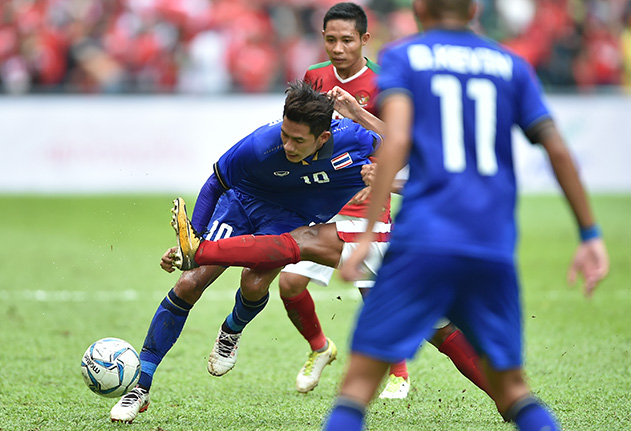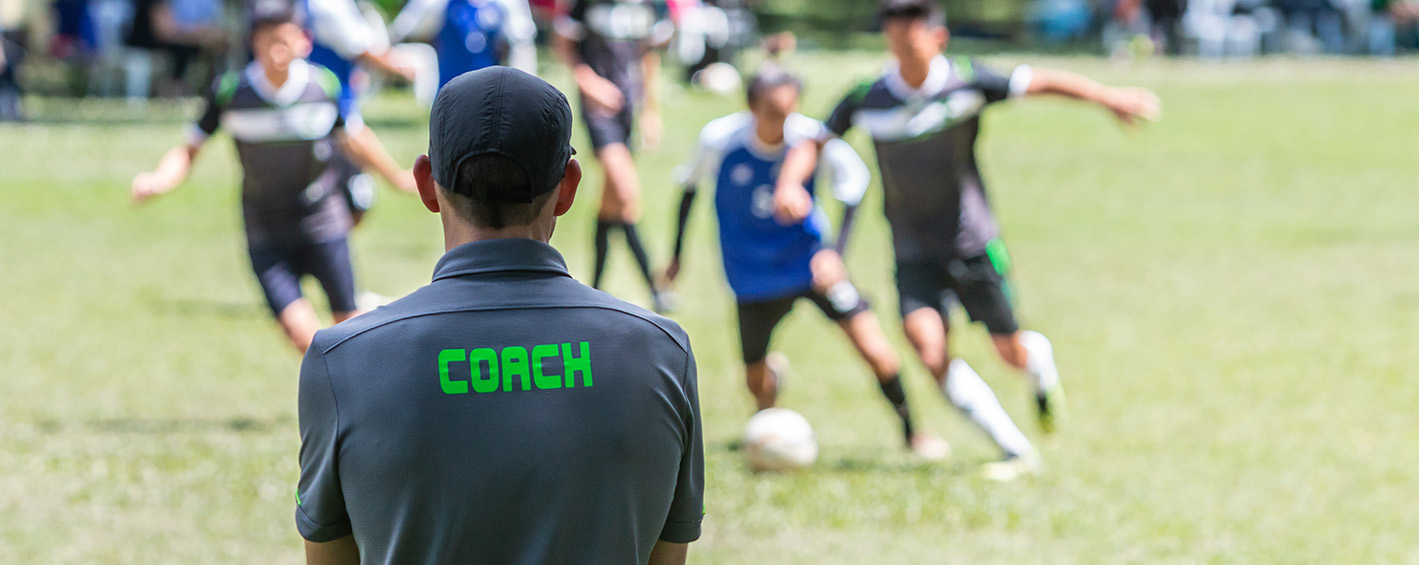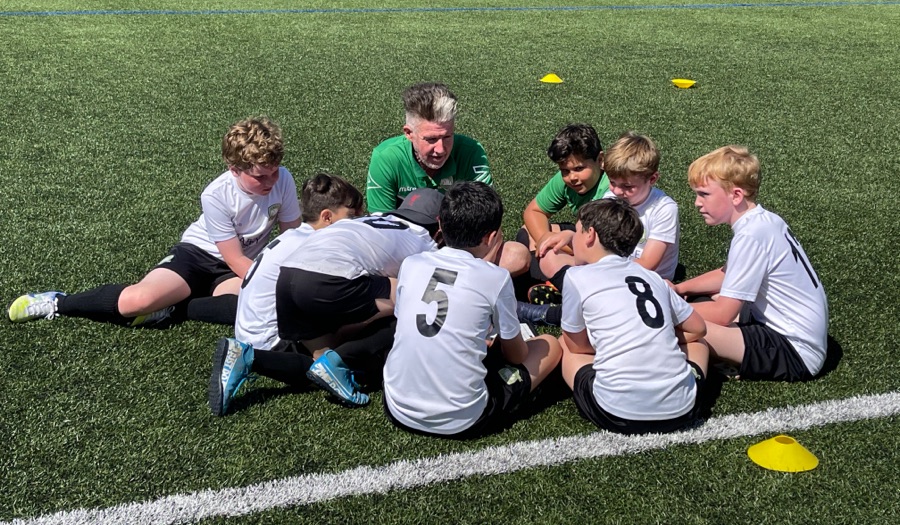Every coach faces it — that moment when your team is up against a side that’s won every game, scores for fun, and looks unbeatable. But these matches can be the greatest teachers for your players.

First, focus on mindset. Your players must believe that effort, discipline, and unity can bridge any gap in skill. Build confidence through your pre-game talk: “They might have won every game — but they haven’t played us yet. Let’s show them our fight, our togetherness, and our football.”
From a tactical perspective, simplify the game plan. Set up with compact lines — make the pitch small when defending and big when attacking. Encourage your players to stay organised, communicate constantly, and hunt in pairs when pressing. Counter-attack quickly, using pace and width, and stress the importance of making good decisions under pressure. Possession should have purpose — short, confident passes to draw the opponent out before releasing a forward runner.
If your team is losing at half-time, stay composed. Focus on small wins: “Can we win the next 10 minutes?” Praise effort, highlight one or two positives, and give clear adjustments rather than criticism. If you’re winning, remind them that the hardest part is keeping focus — encourage calmness in possession, collective defending, and smart use of the ball.
After the match, whatever the result, celebrate the bravery to compete. Emphasise growth, teamwork, and lessons learned: “Games like these make us stronger. Every battle builds belief.”
Remember — football is never just about the scoreline. It’s about character, courage, and the pride of giving everything against the odds.

Coach’s Toolkit: Competing Against a Stronger Team
🎯 Coaching Focus
Build tactical discipline, resilience, and belief when facing stronger opposition. Teach players how to stay compact, transition with speed, and communicate effectively under pressure.
🗣️ Key Coaching Phrases
Use these throughout your session and match to reinforce learning and mindset:
- “Stay compact, stay connected!”
- “Win your duels — every tackle, every header matters.”
- “Be brave on the ball — don’t hide.”
- “Transition fast — first pass forward!”
- “If we can’t play, we protect.”
- “Win the next 5 minutes.”
- “Effort beats talent when talent doesn’t work hard.”
⚙️ Player Challenges
These challenges help players stay mentally and tactically engaged:
- Defensive Unit Challenge: Keep the back line within 10 yards of the midfield when out of possession.
- Transition Challenge: Win the ball and make a forward pass or run within 5 seconds.
- Effort Challenge: Track every runner until the ball is cleared — no jogs back!
- Composure Challenge: Complete three controlled passes after winning possession before countering.
- Team Challenge: Communicate every time your teammate presses or covers.
👀 Coach Observation Tips
What to look for in the game and training:
- Are your players staying organised or chasing the ball individually?
- Is communication clear between defenders and midfielders?
- Do players recognise when to drop off and when to press?
- Are transitions quick and purposeful?
- Is the team’s attitude resilient regardless of the scoreline?
💡Coach’s Message
When playing stronger teams, coaching is about belief, bravery, and behaviour. Praise effort, highlight learning moments, and show your players that courage in adversity defines their development far more than the result.
⚽ Three-Session Coaching Plan: Competing Against Stronger Teams

Session 1: Compact Shape and Defensive Cohesion
Theme: Staying Organised Without the Ball
Time: 70 mins | Area: Half pitch | Players: 14–18 | Difficulty: Medium
Warm-Up (15 mins)
Main Practice (30 mins)
-
Setup: 7v5 defending half-pitch game.
-
Objective: Defensive unit works to stay compact, move as one, and prevent central penetration.
-
Coaching Points:
-
Distance between lines (8–10 yards).
-
Communication between defenders and midfielders.
-
Delaying attackers and showing play wide.
Conditioned Game (20 mins)
Key Learning:
Players understand defensive discipline, communication, and patience — the platform for competing with stronger opponents.
Session 2: Counter-Attacking Transitions
Theme: Winning and Breaking with Purpose
Time: 70 mins | Area: 60x40 yards | Players: 14–18 | Difficulty: Medium–Hard
Warm-Up (10 mins)
-
3v2 transition game: defenders win ball, attack mini-goals.
-
Focus on first touch and quick forward decision-making.
Main Practice (35 mins)
Conditioned Game (20 mins)
-
9v9 full width, half length.
-
Transition rule: must attack within 8 seconds of regain.
-
Bonus point for goals scored within 10 seconds.
Key Learning:
Players learn to attack with speed and intent while remaining structured defensively.
Session 3: Game Realism & Mental Resilience
Theme: Applying Tactics Under Pressure
Time: 80 mins | Area: Full pitch | Players: Full squad | Difficulty: Hard
Warm-Up (10 mins)
Tactical Game (40 mins)
-
Setup: 11v11 with stronger “A” team in possession advantage.
-
Scenario: “Your team is losing 2–0 at halftime.”
-
Focus: Regain structure, press in units, and counter with confidence.
-
Coach Interventions:
Game Reflection (15 mins)
-
Stop-play Q&A: How did we adapt?
-
Discuss mental responses to pressure, scoreline, and momentum shifts.
Key Learning:
Resilience, adaptability, and teamwork — the ultimate traits of a side that can challenge any opposition.
💡Coach’s Summary
Across the three sessions, players move from defensive structure → transition awareness → competitive resilience.
The overall aim is to make your team confident in adversity, tactically sharp, and mentally tough — capable of competing, adapting, and believing, no matter who they face.


